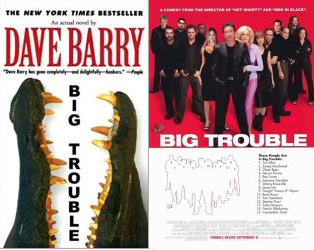If you want my opinion—and why else would you read my columns, after all—Dave Barry’s problem when it comes to fiction is that he’s able to indulge in the “trying too hard” tendencies that get cut out in the editing process when he’s only writing a page or two. He leans hard into the funny names. Unnecessarily wacky goings-on that don’t figure into the plot in any way. That nature of thing. I like Dave Barry, but I think his work tends to be at its best when he’s writing a short piece about a specific thing instead of just indulging himself. Though I won’t deny that there’s plenty of Dave Barry in my own style’s DNA.
Big Trouble is a sprawling-yet-insular story in what Barry himself refers to as the South Florida Wackos genre. It is the story of former journalist Eliot Arnold, now divorced and running his own ad agency. His high school-aged son, Matt, is playing a game called Killer, where he’ll have to shoot one of his classmates with a water gun. This classmate is Jenny Herk, whose stepfather Arthur has been embezzling from his company. Two hitmen, Henry Desalvo and Jack Kehler, have been hired to kill him. Their maid, Nina, is escaping the hitmen—who of course go after Arthur on the same night that Matt goes for Jenny—when she is rescued by Puggy, a drifter who lives in the Herks’ trees.
With us so far? Good; let’s go. Puggy is working at a bar owned by some nefarious Russian mobster types. Arthur goes to them to get a missile for self defense. Some local lowlifes, Snake Dupree and Eddie Leadbetter, decide that anything Arthur has must be worth a lot, and they steal the suitcase—ignoring the briefcase which actually had ten grand in it. Unfortunately, the Russians had been out of missiles and in fact sold Arthur a nuclear bomb instead, like you do. There are lots of goings-on involving assorted cops and FBI agents and so forth, and the whole thing ends with the bomb on a plane.
The movie is much the same. Incredibly star-studded to boot. It’s directed by Barry Sonnenfeld. Okay, maybe Tim Allen was at about the peak of his career at the time. But we’ve got Rene Russo, Stanley Tucci, and Zooey Deschanel playing happy families. Their maid is Sofia Vergara in her first English-language role. The lowlifes are Tom Sizemore and Johnny Knoxville. Puggy is Jason Lee. About half the cast is someone you’ve either heard of or would recognize if you saw them. Even Eliot’s loathsome client is played by Mike McShane, beloved of the British Whose Line Is It Anyway?
It also pretty well sank without a trace. Not because it’s bad, though Gods know we’ll be getting to that, but because its initial release was scheduled for . . . October 2001. It got delayed, naturally. Of course it did. And it wasn’t exactly hyped at the time it was released, in spring of 2002. The blockbuster season has expanded in the last twenty years, but April isn’t really in it now, either. What’s more, the publicity for the movie basically didn’t exist. Though funnily enough, the idea that the FBI agents (Heavy D and Omar Epps, in the movie) would have extralegal abilities to fight terrorism had become more believable in the preceding six months.
I mean, also, it’s bad. Sonnenfeld is a capable director. Oh, maybe not the most prolific one ever, but capable. He’s made a few stone-cold classics—and a few turkeys. He’s also done some great cinematography. He worked with the Coens. He knows how to film a movie. And while I grant you that my viewing—most recent, because I think I might’ve seen it before and just forgotten—was a video that just hasn’t been wiped from YouTube on a copyright claim in the six years it’s been up and which has clearly been badly cropped, it’s still easy to see that it’s an exceedingly ugly film even as it’s intended to be seen.
And—and this is a problem with the source material—the whole thing is far too broad. The movie is winking at you all the time. Patrick Warburton is playing the same cop character he so frequently plays, and there’s nothing wrong with that; you can’t go wrong with that particular Patrick Warburton character. Dennis Farina and Jack Kehler as the hitmen are supposed to be the Only Sane Men in the film. And it’s hard not to see them as such, especially given the fact that they’re also the ones not from South Florida. But Farina’s character in particular is a nuisance, and he only makes it worse in the movie by rolling his eyes every time the automatic seatbelts on the car go past.
I mean, there are worse movies. Lots of them. Particularly worse movie comedies. There are worse novels, too. Especially worse “comedic” novels. However, it’s not difficult to see Barry’s failings in it. It’s still not even a little surprising that book and movie are both pretty well forgotten today. It does seem that most of the movies delayed by September 11 were generally not good, and this is definitely no exception to that. Just reread the book of bad songs or Dave Barry Slept Here or something instead.
Next month, we’ll be going back to the home field advantage of Disney—and a much better movie, I promise you—for The North Avenue Irregulars. Based on a true story. You can pay me for actually managing to get through the book, which I’ve never yet managed, by supporting my Patreon or Ko-fi!

